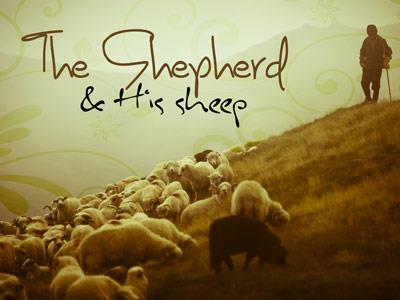-
S. T. A. R. T
Contributed by The Rev Deniray Mueller on May 3, 2023 (message contributor)
Summary: The Good Shepherd offers us a chance to have a new life in Christ
This Sunday is known as ‘The Good Shepherd’ Sunday – almost everyone knows some variation of this parable: the shepherd who knew all the sheep's names, the one who left 99 sheep to rescue one, and gathered them into the sheepfold to be safe.
Here is another image of the shepherd - this time from astronomy. As you look up into the night sky, Saturn is the brightest celestial object after the moon, that mysterious planet with its rings. We learned from the first Voyager probe that Saturn has moons and that the ring is a collection of these moons. The astronomers who identified these moons and their function in the ring dubbed them "shepherd moons."
The shepherd moons bring order from chaos, harmony and beauty from disorder. They ‘shepherd’ millions of particles - some as big as a bus and others as small as a speck - into the Saturn rings.
The shepherd moons are a metaphor for God. They bring together and hold different particles into relationships. Shepherding, in this sense, gathers us as persons and as communities. The shepherd moons represent God, who unites things we often see as unrelated in beautiful, symmetrical harmony. The rings of Saturn are an image of our varied, complex, pluralistic world, with many different perspectives, which form a unit by the shepherding care of God.
The shepherd in this image is the one who brings and holds together different parts of our world. Shepherding creates an identity, a person, and a community. It is to make clear that God brings together those things we often take apart. We live in a pluralistic reality, with many different groups, but they are all cared for by God.
God gathers the different particles – that’s us! - together. Diverse experiences make us who we are: our past, our families, our faith, and our self-reflection of ourselves. We create a new reality from those things we find around us. God attracts single units into one reality. In our liturgy and worship - our tradition - we carry the seeds of meaning that keep getting revised. Jesus sums up the past images and breaks open new ones.[1]
Jesus can be a shepherd for our life in the same way. He is guiding us out of confusion by sheltering us. We have nothing to fear; all we must do is answer His voice.
God's love is always here, despite our waywardness. This love comes to us unmerited, there for the asking. It is unlimited love, confronting evil in love. Like Martin Luther King, the good shepherd, and his followers put themselves in the path of danger and are willing to pay the price.
The Good Shepherd challenges us to find the love of God in the world around us, to look for God in unexpected places, unanticipated events, and unconventional faces. It tells us to look for the grace of God where we least expect it. The bottom line is that God's unlimited love is there for everyone.
How we feel and see this unlimited love grounding and directing us is the question. In the church, we learn the meaning of Jesus as our shepherd. The sheep know the shepherd's voice, and He knows the individual needs of those within his care. There are real wolves and thieves out there - people who do not have the best interests of the common good in their hearts. The good shepherd will do everything needed to protect them.
The church's job is to offer support and teach us. We are in webs of relationships; we choose the best of the gifts offered to us. We must imitate this unlimited love. Ultimately, it is up to each of us to make sense of our faith.
How many of you here would like a fresh start in your life?
How many would like to be in the fold of the Good Shepherd?
This morning I want to share a formula for starting over, regardless of failures in the past. The method is known as ‘S. T. A. R. T.
S. T. A. R. T.
S – Stop making excuses.
If we want a fresh start, we must stop making excuses for our failures and blaming others. We’ve got to stop seeing ourselves as victims of our circumstances.
Other people can hurt us, other people can harm us, and other people can scar us. We have a choice - we can determine how we respond to those hurts. Nobody can destroy our life without our permission. The only person who can ruin our lives is ourselves.
T - Take An Inventory Of Our Life
We must take an inventory of our lives. That means we must evaluate all our experiences and discard those failures. We must take stock of our life experiences and learn from them.

 Sermon Central
Sermon Central



